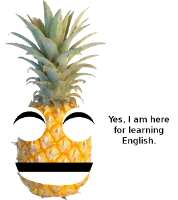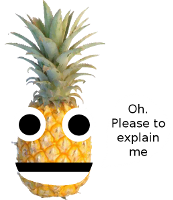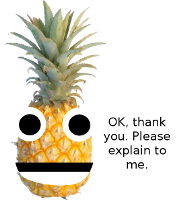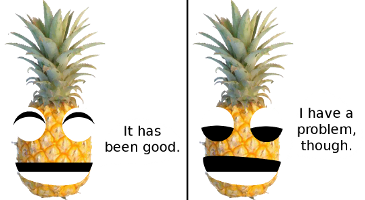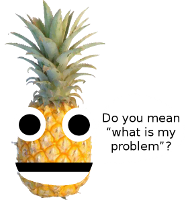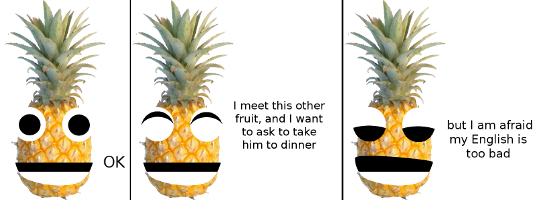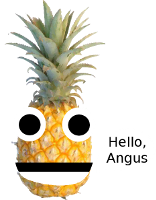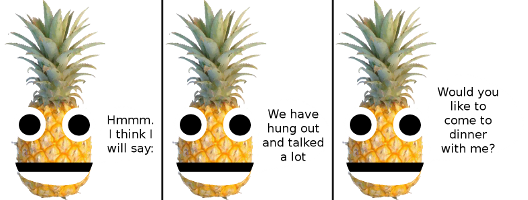One of the prevalent questions on the English Language and Usage – Stack Exchange is about whether a or an is the correct indefinite article to use. It’s a straightforward question, but like all questions, there are subtleties that raise further questions.
General Rule
The question of “a” vs “an” is always decided by the pronunciation of the word that follows the article, without exception. Words that begin with a vowel sound, such as apple, egg, or owl, use the indefinite article an.
I ate an apple yesterday.
All other words, i.e. words that begin with a consonant sound, such as cake, pie, or book use the indefinite article a.
I read a book yesterday.
Vowels, Consonants, and their Sounds
Some words are a little trickier though, and if you’re not familiar with common English pronunciation, you may want to take note of things that can trip people up. Note that I said vowel sounds and consonant sounds earlier, not just vowels and consonants. There’s a reason for this—many people think that vowels and consonants are letters, and making it clear that this is misleading is vital. We’ll keep up this distinction to reinforce the concept.
In fact, vowels and consonants are sounds. Letters thought of vowels (i.e. a, e, i, o, u, and sometimes y) can have a consonant sound, and vice versa, so it just might be a good idea to check a dictionary with pronunciations when you’re unsure. We’ll be using IPA pronunciations here, but any good dictionary will have some reasonable pronunciation guide.
Aitches
If you have a word that begins with the letter h, there’s a good chance that the h is silent (i.e. doesn’t make a sound). For example, take the word hour, which has a pronunciation of /aʊ̯ɚ/, and compare it with the word hospital, which has a pronunciation of /hɒspɪtəl/. Note that hour, even though it begins with a consonant, does not begin with a consonant sound as the initial h is silent; rather, it begins with the subsequent vowel sound. However, hospital does not have a silent h, and thus the h is pronounced as a consonant, and hospital is used with the article a.
I was at a hospital for an hour.
Wyes
There’s another common problem. Elementary school teachers seem to love teaching their students that there are five vowels (i.e. a, e, i, o, u), and sometimes y is a vowel as well. This is true because y can have both a vowel sound and a consonant sound, but it’s extremely misleading because these same teachers also instill the idea that the letters are in and of themselves the vowels.
But that’s going off on a tangent—when does y make a vowel sound? Just like with h, the answer is when it does. There are few guidelines to work with, but in most cases, when a word begins with a y and is not a proper noun (in which case you wouldn’t be using an indefinite article anyway), it’s probably a consonant sound. Still, you might want to check your dictionary if you’re unsure.
I had lunch on a yacht. /jɒt/
More Vowels and Consonants?
Another corner case I want to point out are words beginning with u. In a fair number of these, such as uniform, user, and unicorn, the u is actually making a consonant sound that’s much like the y consonant sound—it’s represented in IPA as /j/.
A unicorn became my very best friend.
Even though I’ve warned you about these pitfalls, there are more cases where vowels and consonants don’t seem to be what they should be, so if you don’t know how to pronounce a word, a dictionary can be your very best friend (unless you have a dog, in which case the dictionary will be your second best friend).
Acronyms and Initialisms
Ok, so we’ve gotten the basics down. But English isn’t that straightforward—what happens when we bump into acronyms and initialisms? Remember, the general rule is 100% right—we’re only calling it general because we want to look at the corner cases. In fact, this is one of the few rules in English that is never violated in Standard English.
How you pronounce the acronym/initialism directs the article you choose. If you say FAQ as three different letters, i.e. /ɛf.eɪ.kjuː/, you begin with a vowel sound and should use an. If you say FAQ in one syllable, i.e. /fæk/, you’re beginning with a consonant sound and should use a.
A NATO exercise will begin in thirty minutes.
An AIDS treatment is due to be tested shortly.
N.B. If you’re wondering why we don’t make the distinction between acronyms and initialisms here, it’s because there’s disagreement about the exact definition of the terms.
Parenthetical Statements
Another common area of confusion is parenthetical statements. Imagine that you’re reading the sentence. If you include the parenthetical statement when you read it aloud, the first word in the parentheses decides the article. If you skip it, then use the word immediately following the close of the parentheses. When in doubt, it’s usually safer to assume the parentheses would be read aloud.
If you’re wondering when a parenthetical statement might come after an article, it most often appears to insert an adjective (e.g. I need a/an (lovely) evening to myself).
But My Pronunciation Is Different
You might disagree with some of my examples because you pronounce the word following the article differently than I do, and that’s perfectly fine. I’ve done my best to choose cross-dialectal examples, but some dialects are so different it’s hard to make all examples work. What you should keep in mind is that you’re writing or speaking to an audience—if they’re all from a specific region, try to use the pronunciations they would when you’re choosing articles. If they’re from a variety of regions, then choose the most common pronunciation.
Filed under Grammar
Tagged: articles, pronunciation


